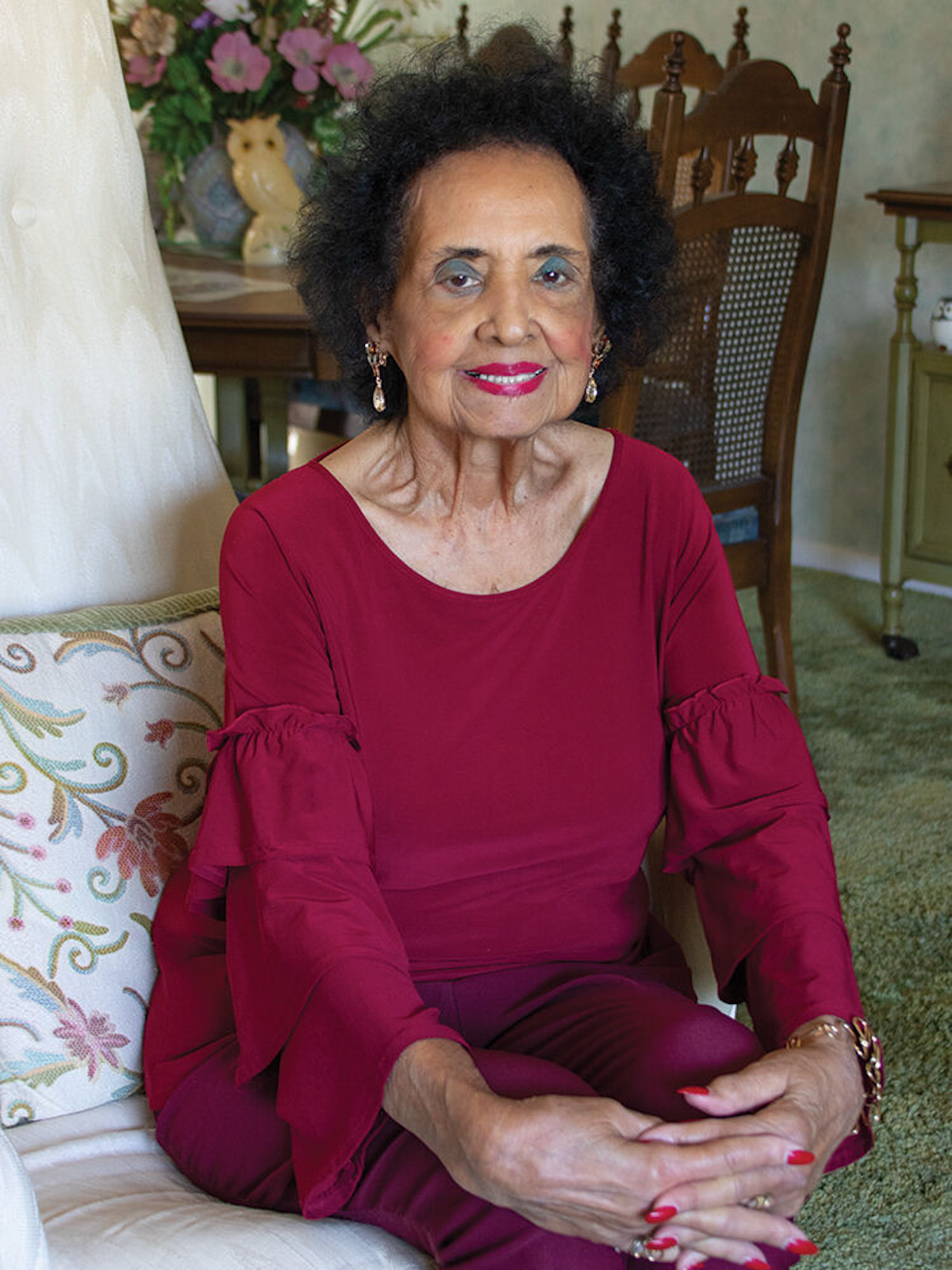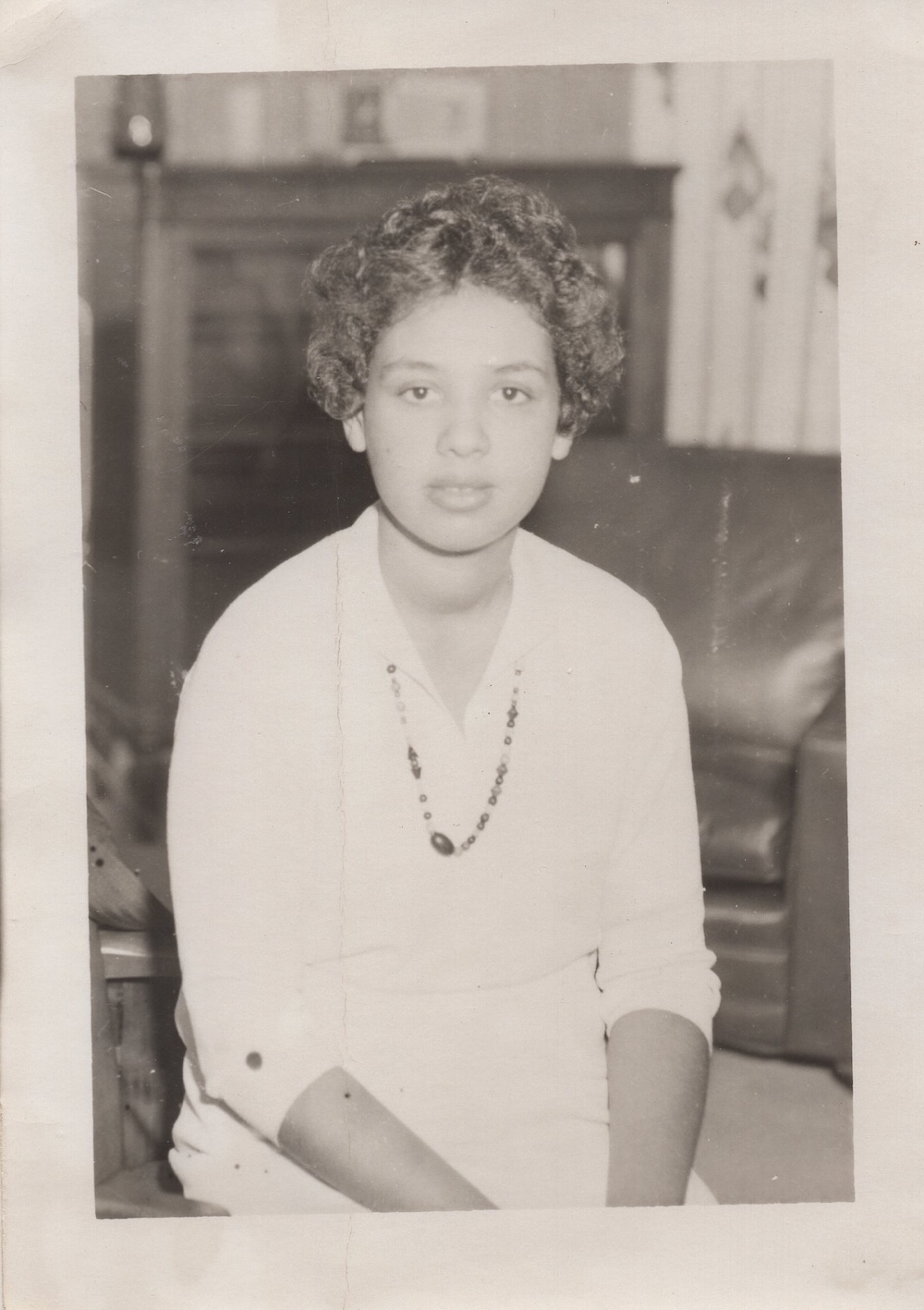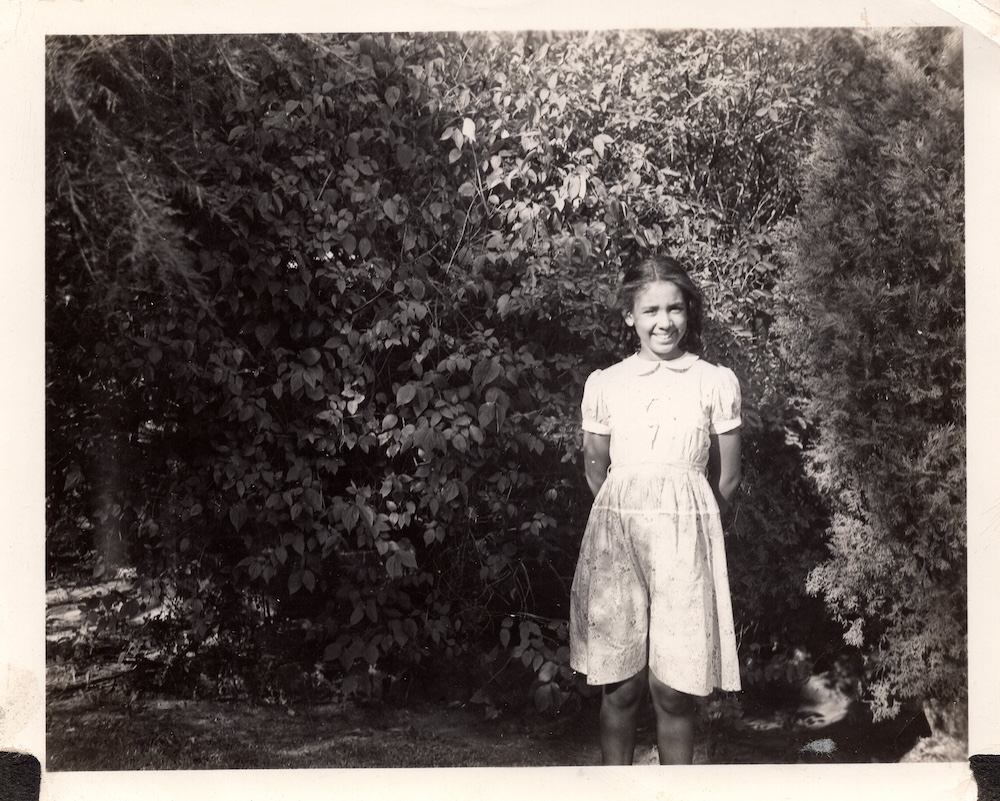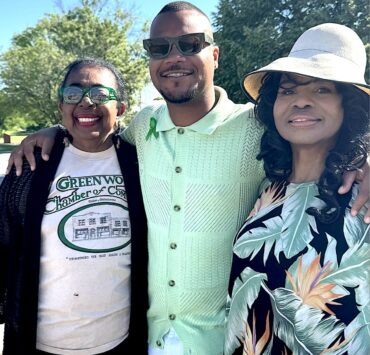
OBITUARY
Victor Luckerson, The Oklahoma Eagle
Mrs. JoAnn Goodwin Photos, Courtesy of Goodwin Family
LAWRENCEVILLE, Georgia – JoAnn Goodwin Fields Gilford, a Tulsa community stalwart who shattered racial barriers as an educator, school board member and principal, died May 12, in Lawrenceville, Georgia. She was 91.
Mrs. Goodwin Fields Gilford had been splitting her time between Tulsa and Georgia, where she was living with her daughters, Michelle Fields Wilson and Lisa Fields-Miller.
Mrs. Goodwin Fields Gilford’s services will be held at 11 a.m., June 3, at First Baptist Church North Tulsa, 1414 N. Greenwood Ave., where she and her family were longtime members.

Mrs. Goodwin Fields Gilford dedicated seven decades of her life to educating generations of young people, from first graders in Iowa in the 1950s to English-language-learners in Georgia,in recent years. She spread the joy of knowledge with a fashionable flair, a magnetic wit, and a wry, knowing smile. The bulk of her time as an educator was spent in her hometown of Tulsa, where she became the first Black teacher to integrate a historically white school and the first Black woman to serve on the Tulsa Public Schools Board of Education. She often credited her success to her upbringing in a community-oriented family that taught her that all dreams are achievable.
“We were always put in the position to say, ‘Hey you can do it.’ And that’s what I’ve passed down to my kids and their kids,” Mrs. Goodwin Fields Gilford once reflected. “That all things are possible if you believe.”
Mrs. JoAnn Goodwin was born Sept. 18, 1933, in Tulsa’s Historic Greenwood District. She was the second child of nine of Edward L. Goodwin Sr. and Jeanne B. Osby Goodwin, herself a dedicated educator. In the Historic Greenwood District, Mrs. Goodwin Fields Gilford enjoyed the heyday of the legendary “Black Wall Street” – she and her older sister Edwyna ran an ice cream shop on North Greenwood Avenue as teenagers while proofreading pages of their family-owned The Oklahoma Eagleeach week (young Mrs. Goodwin Fields Gilford also wrote a dishy gossip column in the newspaper called “Teen Tattle”).
Mrs. Goodwin Fields Gilford was famous for her independent streak – she once described herself as “militant, verbal, articulate, and concerned.”
In 1951, her senior class at Booker T. Washington High School was the first to graduate from the newly opened school that relocated to the East Zion Street site from the Historic Greenwood District.
Mrs. Goodwin Fields Gilford was known in the community and in church for her “beautiful, operatic voice,” according to her younger brother, James O. Goodwin.
She had initially studied music for two years at Fisk University – the famed Historically Black College and University in Nashville, Tennessee, following the route of her parents, older sister Edwyna and other relatives. She also received a scholarship to study opera in Vienna, Austria.
Upon returning home, Mrs. Goodwin Fields Gilford recalled her mother saying, “‘Jo, I’d much rather have you sing in the church.’ So, I changed my major and minored in music.”
She soon decided to transfer to Kansas State Teachers College (now Pittsburg State University) and carve her own path as a teacher. The college was two hours away from her family’s farm in Alsuma in southeast Tulsa.





She earned a degree in elementary education in 1955, graduating just a year after the U.S. Supreme Court’s Brown v. Board of Education of Topeka ruling struck down the “separate but equal” doctrine in American public schools. Mrs. Goodwin Fields Gilford got her first job teaching first graders in Des Moines, Iowa. She was the 26th Black teacher hired in the entire state, and the only Black teacher at her school. But being a pathbreaker came naturally to her.
“Miss Goodwin loves children and her job,” the Eagle reported at the time. “She’s quite happy as it is what she always wanted to do.”
While teaching in Iowa, Mrs. Goodwin Fields Gilford married Ernie Fields, Jr., an accomplished musician and her former classmate at Booker T. Washington High School. When Fields was stationed in Germany on an Army assignment, the couple moved to the town of Heidelberg, and Mrs. Goodwin Fields Gilford continued teaching first graders there. Next came a short stint in the District of Columbia Public Schools in Washington, D.C.. In 1961, Mrs. Goodwin Fields Gilford and her family returned to Tulsa to begin teaching in her hometown.
Tulsa was going through a period of racial upheaval–one of many for the city. Following Brown v. Board, Black students were starting to enroll in previously all-white schools, and Burroughs Elementary School in North Tulsa became a flashpoint of this transition. Many white parents at the school resisted the change, maintaining an all-white Parent Teacher Association and voting down a proposal to allow Black women to serve as homeroom mothers. One white mom “became hysterical” when she visited the school and saw that her child’s class was mostly Black.
Mrs. Goodwin Fields Gilford was assigned to teach at Burroughs in the fall of 1961 because of her previous experience teaching white students in Germany and Iowa. She became the first Black educator to integrate Tulsa Public Schools’ previously all-white school in north Tulsa. Memories from her childhood of Tulsa’s deeply rooted segregation lingered for her; on the first day of school, she asked her father to drive her to the building for her protection. But Goodwin Fields Gilford ultimately thrived at the school, teaching classes full of both Black and white children. In 1965, she received a National Teacher of the Year award. “I didn’t see kids in color,” she said.
After seven years teaching at Burroughs, Mrs. Goodwin Fields Gilford worked as the first African American to be named reading supervisor for Tulsa Public Schools’ junior and senior high schools. She also served as president of the Parent Teacher Association at Booker T. Washington High School. In the interim, she also received her master’s degree from Southeastern University in Durant, Oklahoma.
In 1977, she set her eyes on the Tulsa School Board, where she made history again as the first Black woman elected to the body. Ultimately she preferred to continue her hands-on work with students, though, and resigned from the post in less than a year.
In 1986, Mrs. Goodwin Fields Gilford became principal of Alcott Elementary School, where she helped raise student reading levels and put an end to corporal punishment policies, which was the catalyst for Tulsa Public Schools to eventually ban. “Everybody in Tulsa was angry with me because I said no more hitting,” she told Tulsa People magazine in 2023. “Eventually, they did away with it. I even went to the governor and talked about it.” She received an “Effective Principal Certificate” from Tulsa Public Schools for her work at Alcott.
Mrs. Goodwin Fields Gilford formally retired from Tulsa Public Schools in 1990 and was later inducted into both the Oklahoma African American Educators Hall of Fame and the Oklahoma Educators Hall of Fame. But she continued to teach students long after leaving the workforce.

In 2012, Tulsa Public Schools gave her its “Volunteer of the Year Award.” Whenever she returned to her hometown, well into her 80s and 90s, she was frequently stopped by appreciative former pupils. Many students also wrote her letters showing just how much she’d touched their lives. “I really don’t want you to leave the school because I don’t want another principal,” one student wrote to her when she left Alcott. “You said, ‘If you look good, smell good, and feel good, you are good.’ You made me feel like this is my home away from home. So all I have to say is goodbye, and thank you for your support.’”
In 2024, the Pittsburg State University Alumni Association awarded Mrs. Goodwin Fields Gilford the university’s highest honor, the Meritorious Achievement Award, noting that “your career achievements, community involvement, service, and list of achievements is nothing short of outstanding. Pittsburg State University is proud of you!”
Outside the Classroom
In addition to teaching, Mrs. Goodwin Fields Gilford spent a lifetime as a lover of the arts. She began singing at the age of five and once considered pursuing a career as an opera singer in Vienna, Austria before becoming a teacher. She was also an avid writer, penning poetry about current events and the human condition well into her 90s. One of her poems was published in Nimrod, the University of Tulsa’s award-winning literary journal.
Mrs. Goodwin Fields Gilford was a lifelong collector of owl memorabilia and her home became a sanctuary for a vast array of artifacts celebrating the bird noted for wisdom, insight and vigilance. Those qualities often found their way into her professional and personal writings.
Known as a prolific poet and essayist, her family recently published a collection of poems in a book, “What I Say, What I Do,” to celebrate her 91st birthday in 2024. It was published with the assistance of her niece, Sabrina Goodwin Monday. Mrs. Goodwin Fields Gilford’s story was also chronicled in the book, “Built From The Fire: The Epic Story of Tulsa’s Greenwood District, America’s Black Wall Street.”
Mrs. Goodwin Fields Gilford was also known for her sense of humor, and a personality that could turn from gentle to biting on a dime, emulating a trait that was part of her mother’s lore. “I have a sharp wit,” she told Tulsa People. “If you play a game of Scrabble with me, prepare to lose because they say I’m ultra-competitive.”
Her second husband, Lucius G. Gilford, passed away in 2005. The family said her life with Lucius was fun and loving. He was one of Mrs. Goodwin Fields Gilford’s mother, Jeanne, primary caregivers before his death.
Mrs. Goodwin Fields Gilford thought of family as an ever-growing support network that could be greater than the sum of its parts. She often recalled fondly the Sunday evenings from her childhood when she, her parents, and her siblings would play music together in the living room long into the evening (Mrs. Goodwin Fields Gilford learned to play the accordion, at her father’s behest). “All of us, no matter where we are, ya know or what we’re doing, we’re always supporting of family,” she said.
In recent years, Mrs. Goodwin Fields Gilford had expressed growing concern about the efforts to erase Black history from school curricula. Her father and grandparents, J.H. and Carlie Goodwin, were survivors of the 1921 Tulsa Race Massacre.
“It’s such a disappointment to me because for my family, my dad, my grandfather, my mother, the sacrifices that their people made were a part of our upbringing,” she told Tulsa People. “With all the history being taken out of the classrooms we’re going to lose a lot of identity and possibilities.”
But Mrs. Goodwin Fields Gilford’s life story was all about barrelling through the barriers society tried to put in front of her due to her race or gender–all while cracking a confident smile. She lived a life worth modeling in her dedication to others while always being true to herself.
“Every day you’re going to be involved with an indifference that shatters you. But the thing is, are you strong enough not to ignore it but do something about it?” she mused recently. “That’s how I’ve carried myself.”
Besides her daughters, Mrs. Goodwin Fields Gilford is survived by her brothers, James O. Goodwin of Tulsa, and Robert K. (Ruth) Goodwin of Goose Creek, South Carolina; sisters, Jeanne (John Sr.) Arradondo of Nashville, and Susan Goodwin (Johnnie) Jordan; grandson, Ryan (Johanna) Brown; granddaughter, Paige (Victor) Merrick; great-grandsons, Landon, Cole and Goodwin; and great-granddaughters, Aalanie, Ayla and Lennon. She was preceded in death by her parents and husband; a grandson, Nicholas Blakely; sisters, Edwyna Goodwin Dones Anderson, Onetha Manuel Goff Scott, Carlie Goodwin; and a brother, Edward L. Goodwin Jr. She also leaves behind a cadre of nieces and nephews. Her first husband, Ernie Fields Jr., died in 2024.
In lieu of flowers, the family ask donations be made to her late grandson’s nonprofit, The Nick Blakely Foundation, whose mission is to help prevent sudden cardiac arrest deaths in young athletes by donating automated external defibrillators to schools and athletic fields in Georgia and nationwide.
Jack’s Memorial Chapel is handling funeral arrangements.










